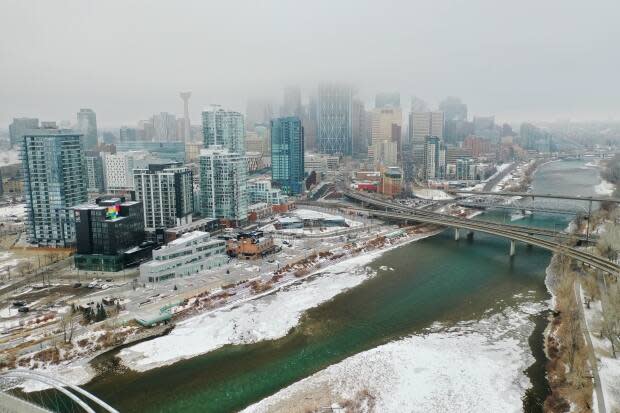Calgary council approves $43M for business support and cap on tax hikes

Another year of business tax relief is on the way in Calgary after city council unanimously supported a plan to spend $43 million to cap increases and support those impacted by the pandemic.
The plan would spend $13 million to keep non-residential property taxes to a limit of 10 per cent higher than last year in order to help soften the ongoing issue of businesses outside the core picking up the financial slack for Calgary's hollowed out downtown.
The remaining $30 million would be used for a yet-to-be-defined relief program for local businesses. The details of that targeted support are expected to be unveiled at council on March 22.
Debate in council focused on the need to ensure small businesses that are directly impacted by the pandemic receive the funds they need and money does not flow to larger corporations with a more robust balance sheet.
Band-Aids and focused relief
Coun. Jeromy Farkas first introduced a motion to spend $44 million to ensure there were no tax increases for any businesses in the city, which was approved by a council committee.
But that plan was altered significantly through an amendment by Coun. Jeff Davison on Monday that was ultimately passed.
Davison said using the phased tax program, which offsets spiking tax rates, benefits too many businesses that have profited while others suffered.
"One of the things we need to do is figure out a better way that we can support local," he said.
Coun. Druh Farrell, who recently announced she would not seek re-election, said she was supporting the plan but stressed it was yet another Band-Aid solution to a persistent civic issue.
"We need to focus on the problem, not the symptom of the problem, which is the tax shift," she said.
"We need to focus on downtown recovery. So again, I urge all members of council to get involved in the downtown strategy. It's all-encompassing, and it will require at least a decade, perhaps more, of concerted effort by by the City of Calgary."
The city has long relied on a downtown stuffed with head offices and the resulting staff to help cover a big portion of the money flowing into city accounts, a model that collapsed alongside the price of oil.
Property taxes function in such a way that tax money that has disappeared from the downtown towers must be covered by businesses outside the core, leading to the potential for massive increases.
The vacancy rate downtown is hovering around 30 per cent and values have plummeted.
The province responds
Council over the past few years has alleviated that pressure by consistently approving one-time allocations of reserve money in order to limit increases despite concerns it is simply pushing the issue down the road.
Since 2017, the city has spent over $200 million on tax relief for businesses.
Last fall, city council opted to give non-residential properties a small tax cut overall.
However, some business properties where land values went up will still face double-digit tax hikes in 2021.
On Monday, the minister of jobs, economy and innovation, Doug Schweitzer, penned an op-ed in the Calgary Herald saying the province will form a working group to look at helping Calgary's downtown. He promised town halls on the issue through the coming months.
That was met with skepticism from Calgary's mayor later in the day.
"Well, minister, with all due respect, welcome to the party. We're happy to have you and we need your help. We don't need town halls for the next four to five months, we've been working on this for years," Naheed Nenshi said.
"Business owners have spoken — business owners who are here, business owners who want to be here. We will be presenting a downtown strategy to council in the next few weeks based on all of that input, and we're really happy to have the province on board, but don't reinvent the wheel."
Meanwhile, Calgary Chamber of Commerce CEO Murray Sigler said in an emailed statement that the organization welcomes the relief for businesses but hopes to see other changes made to alleviate property tax increases for businesses in the coming years.
"The city's current financial position demands thoughtful and creative solutions to reduce costs and generate revenue without placing the tax burden on businesses and the citizens they employ and serve. Today's measures point us in the right direction. But many businesses in Calgary will still see property tax increases next year due to structural problems within the tax system, and the shift of the tax burden from the highrises in our downtown to businesses outside of the core," read Sigler's statement in part.
"We must ensure fairness and sustainability in our property tax system. We urge city council to shift the non-residential to residential tax ratio, reduce the cost and increase the effectiveness of local government, make better use of non-revenue generating city-owned land, and contribute to reimagining the municipal-provincial relationship."

